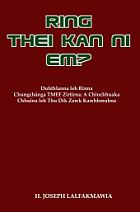(e-mail a ka dawn ania, Infosys employee te tana an duan a nih hmel. Tangkaipui kan awm takin ka lo share e).
1. Do not write “the same” in an email – it makes little sense to them.
Example – I will try to organize the project artifacts and inform you of the same when it is done. This is somewhat an Indian construct. It is better written simply as: I will try to organize the project artifacts and inform you when that is done.
2. Do not write or say, “I have some doubts on this issue”
The term “Doubt” is used in the sense of doubting someone – we use this term because in Indian languages, the word for a “doubt” and a “question” is the same. The correct usage (for clients) is: I have a few questions on this issue
3. The term “regard” is not used much in American English. They usually do not say “regarding this issue” or “with regard to this”. Simply use, “about this issue”.
4. Do not say “Pardon” when you want someone to repeat what they said. The word “Pardon” is unusual for them and is somewhatb formal. You can say, ‘Please come again or could you please repeat.’
5. Americans do not understand most of the Indian accent immediately – They only understand 75% of what we speak and then interpret the rest. Therefore try not to use shortcut terms such as “Can’t” or “Don’t”. Use the expanded “Cannot” or “Do not”.
6. Do not use the term “screwed up” liberally. If a situation is not good, it is better to say, “The situation is messed up”. Do not use words such as “shucks”, or “pissed off”.
7. As a general matter of form, Indians interrupt each other constantly in meetings – DO NOT interrupt a client when they are speaking.
Over the phone, there could be delays – but wait for a short time before responding.
8. When explaining some complex issue, stop occasionally and ask “Does that make sense?”. This is preferrable than “Do you understand me?”
9. In email communications, use proper punctuation. To explain something, without breaking your flow, use semicolons, hyphens or paranthesis.. As an example:
You have entered a new bug (the popup not showing up) in the defect tracking system; we could not reproduce it – although, a screenshot would help.
Notice that a reference to the actual bug is added in paranthesis so that the sentence flow is not broken. Break a long sentence using such punctuation.
10. In American English, a mail is a posted letter. An email is electronic mail.
When you say “I mailed the information to you”, it means you sent an actual letter or package through the postal system. The correct usage is: “I emailed the information to you”
11. To “prepone” an appointment is an Indian usage. There is no actual word called prepone. You can “advance” an appointment.
12. In the term “N-tier Architecture” or “3-tier Architecture”, the word “tier” is NOT pronounced as “Tire”. I have seen many people pronounce it this way. The correct pronunciation is “tea-yar”. The “ti” is pronounced as “tea”.
13. The usages “September End”, “Month End”, “Day End” are not understood well by Americans. They use these as “End of September”, “End of Month” or “End of Day”.
14. Americans have weird conventions for time – when they say the time is “Quarter Of One”, they mean the time is 1:15. Better to ask them the exact time.
15. Indians commonly use the terms “Today Evening”, “Today Night”. These are not correct; “Today” means “This Day” where the Day stands for Daytime. Therefore “Today Night” is confusing. The correct usages are: “This Evening”, “Tonight”. That applies for “Yesterday Night” and “Yesterday Evening”. The correct usages are: “Last Night” and “Last Evening”.
16. When Americans want to know the time, it is usual for them to say, “Do you have the time?”. Which makes no sense to an indian.
17. There is no word called “Updation”. You update somebody. You wait for updates to happen to the database. Avoid saying “Updation”.
18. It is usual convention in initial emails (particularly technical) to expand abbreviations, this way: We are planning to use the Java API for Registry (JAXR).
After mentioning the expanded form once, subsequently you can use the abbreviation.
19. Make sure you always have a subject in your emails and that the subject is relevant. Do not use a subject line such as HI.
20. Avoid using “Back”. Instead of “Back” Use “ago”. Back is the worst word for American. (for Days use “Ago”, for hours use “before”)
21. Avoid using “but” instead of “But” Use “However”.
Similar Posts:
- Hmeichhe pakhat hnena ka lehkha thawn – Part I
- Payee endorsement required?
- Hmeichhe Pakhat hnena ka lehkha thawn – Part II
- So…
- Don’t wear ID cards out of the campus!








November 14th, 2012 at 11:36 pm
LIKE

6 na a “Shucks” tih aiah khian “suck” tih tal hmang zawk hram ta sela
Report this comment
November 14th, 2012 at 11:41 pm
Mind blasting!
Report this comment
November 15th, 2012 at 1:54 am
Good post!
A hmuna chenchilhten han sawibelh zel teh u
Report this comment
November 15th, 2012 at 3:14 am
Merican ho ka dawr hran lo bawka, ka chhiar chhuak ta lo mai. Mahni sum hnuhna lam anih chuan an tawng hriat a tha. Chuvang chuan ania Silchar, Gwahati vela vai Duhlian tawng an zir hram hram ni.
Report this comment
November 15th, 2012 at 5:00 am
Report this comment
November 15th, 2012 at 8:50 am
Hei chu ka va duh ve..
1. khi kan kz-pup nghal anghe nghe nghe ha
Report this comment
November 15th, 2012 at 10:44 am
A hmuna awm ten sawibelh thei se aw, a bengvarthlak ve a.
Report this comment
November 15th, 2012 at 12:11 pm
A thatna mual mual chu a awm ngei ang le
Report this comment
November 15th, 2012 at 12:20 pm
Why is ‘back’ the worst word for Americans?
Report this comment
November 15th, 2012 at 12:47 pm
Bengvarthlak e. American ho ka hmuh hunah ka lo test chhin ang e!!
Report this comment
November 15th, 2012 at 6:20 pm
Awle…
Report this comment
November 15th, 2012 at 9:46 pm
Bengvarthlak. Point #1-3 khi British ho chuan an hman ka hre fo mai. Tin, #4 ah hian “I beg your pardon?” tih hi an hmang thin emaw ka lo tia.
Report this comment
November 16th, 2012 at 10:04 am
tha hle mai. hmanniah conference kan nei a, American pa thusawi kha vaipain a let a..acronym tih a hman kha a hre ta si lo va..min zawt ve khanglang a abbreviation tiin ka chhang a, a ni lo tih chu ka hre tho. vaiho hriatthiam dan a ni…dictionary phei chuan easy to confuse with abbreviation a tiin ka hria. hman dan leh hriatthiam dan kan nei vek a…kan inhriatthiamtawnna kha a tul ber awm e.
Report this comment
November 16th, 2012 at 11:50 am
Ka chhiarchhuah parh chu le. Bengvarthlak
Report this comment